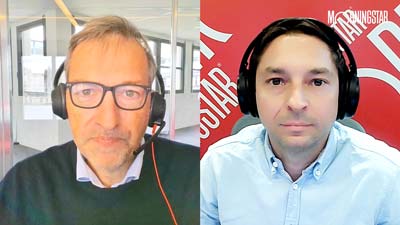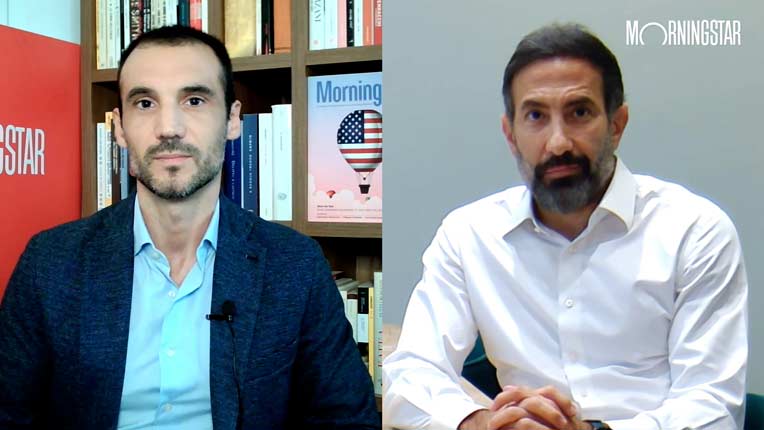Robert van den Oever: Welcome to Morningstar. Today I talk to Morningstar Manager Research Analyst, Jeana Doubell, and we will be walking through some of the big moves that have been made by Europe's largest asset managers as these firms jostle for room in navigating the industry's most material long-term trends.
So, Jeana, let's start with a view on the global asset management industry. What is the leading trend that is driving strategic business decisions for these asset management firms?
Jeana Doubell: Well, we've seen a great deal of consolidation in the market actually, specifically between Europe's largest players. That could be because of just taking advantage of general inefficiencies in the markets or because of the downward pressure on fees. That's an ongoing trend as well. So, for example, one of the most recent big acquisitions that was announced in the market was BNP Paribas' asset management firm, which will be acquiring AXA's asset management firm. These are two big French investment names. And the AUM of the combined entity will actually come to a staggering 1.5 trillion in assets under management if we include their money market funds. Now, that's quite large and will probably put the combined entity as one of Europe's largest asset managers. Ideally, we would, from an investor point of view, like to see that increase in market share, that increase in revenue, also transfer into savings for our investors, looking at economies of scale, passing that on to the investor and perhaps lowering fees for the end investor.
Van den Oever: Okay. An interesting new development, a new combination, and that comes just about only a year after two other major players, namely UBS Group and Credit Suisse, announced an acquisition, right?
Doubell: Yes, that's true. But I'd say in that case, the reason for the acquisition was slightly different. You see, usually for acquisitions of this size, the regulatory approval process can be really long-winded and drawn out. But in the case of UBS and Credit Suisse, we saw Swiss regulators actively encouraging that acquisition deal.
Van den Oever: Okay, I see. And now, what made it different? Was there a different theme rather than decreasing fees driving the acquisition?
Doubell: Indeed. So, if we take a step back, Switzerland has really been one of the hubs of the banking sector in Europe with a strong and robust reputation for banking actually globally, really. And Credit Suisse has been a large part of that. The firm has been around for over 150 years. So, it's got quite a substantial history. Although its success arguably peaked around about 2007, just ahead of the Great Financial Crisis. But since then, a series of scandals and management missteps have resulted in significant outflows, which really culminated in 2022. We saw huge outflows then leading into 2023.
And around about that same time, we also saw the failure of two U.S. regional banks. And although they were smaller players, Silicon Valley Bank and Signature Bank, their demise really led to shockwaves going through banking system globally. And so that put French and Dutch and generally just European regulators really on edge, including the Swiss regulators. And so, they actively stepped in and encouraged the acquisition by UBS of Credit Suisse in order to stop a banking sector or any possibility of a banking sector demise. So, in this case, it was really due to trying to uphold the reputation and the robustness and the transparency of the banking sector overall.
Van den Oever: Yes, indeed. Reputation and transparency have been key focal points since the Great Financial Crisis. But how much are investors really swayed by all this?
Doubell: Quite considerably. We find that management missteps or a company charging high fees really dissuades investors quite considerably. An example of this can be seen in GAM Investments, which in 2018 had a significant scandal surrounding its Absolute Return Fund range and that led to significant outflows in the years since then. Even a leadership reshuffle or considerably slashing its fees were not enough for the firm to regain its footing considerably in the market. So, we then saw a buyout offer from London-based Liontrust Asset Management, which offered to buy the firm. But in a series of high-profile boardroom fights, instead, that offer was obstructed, and we saw an activist group, NewGAMe, come in and become the core shareholder of GAM Investments instead. So, it will largely be up to them to rebuild the reputation of GAM in the market and to ensure their financial stability going forward.
Van den Oever: Okay. Interesting development there. Are acquisitions or potential acquisitions between players of this magnitude historically as common?
Doubell: Well, if we go back about 15 years, we saw the merger of Société Générale and Crédit Agricole Asset Management back in 2010. And that basically resulted in Amundi, which is arguably the biggest asset manager in Europe. They've cemented that position through several further acquisitions and moves. We saw the IPO of Amundi in 2015. In 2017, they also acquired one of their largest competitors at the time. More recently, in 2022, they acquired the Lyxor Investment Management passive specialist. That's quite interesting as well, because it brings me to another trend that we've seen driving a lot of moves in the industry, actually, is that drive into passive investments. At the same time, because pursuing passive investments can cannibalize some of the profits on more active capabilities and products, we've also seen asset managers push into alternative investments. Because for products like private equity and private debt, it's possible for firms to charge slightly higher margins on those products because of the extra due diligence and long-term time horizons required for those products.
Van den Oever: Okay. And moving from there into examples, which key players come to mind when you consider pushes into both passives and alternative investments?
Doubell: Well, BlackRock is definitely a market-leading ETF provider, and that really started or came to life with its acquisition of iShares, the ETF platform back in 2009 from then Barclays. Since then, it's really become a household name offering a wide range of products to investors across Europe. That makes sense considering the 3.5 trillion in assets under management, so really a considerably sized firm. More recently, they've also pushed into alternative investments, and we saw that through the July 2024 announced intention that they would acquire the data provider for alternative investments, Preqin based in London. That will be a considerable advantage for them considering that within alternative investments, one of the biggest challenges remains access to high-quality data. So, for BlackRock to be acquiring Preqin and having more direct access to good, clean data will definitely enhance their ability to be able to pursue alternative investments.
Van den Oever: Okay, very interesting. So, in summary, we're seeing that market consolidation and a push into both passive and alternative investments are playing a key part in driving business strategy among some of Europe's biggest asset management names. Jeana, thank you very much for all your insights in what's going on in the European asset management industry. For Morningstar, I'm Robert van den Oever.




























